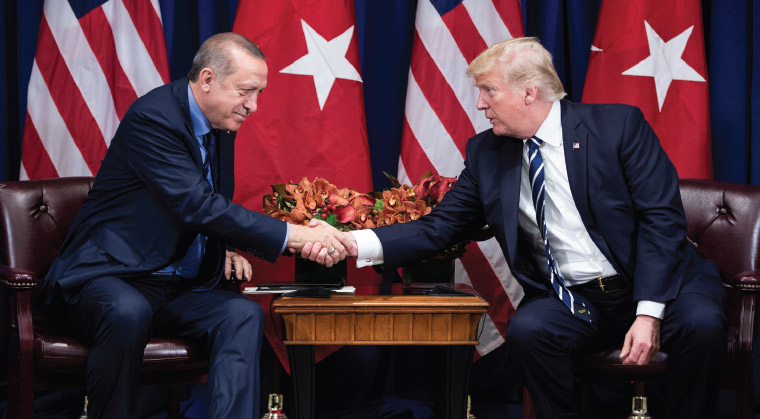Trump Talks Turkey with Erdogan


(Photo: AFP IMAGEBANK)
T
he beginning actually looked quite promising, when President Trump invited Turkish president Recep Erdogan to the White House in May 2017. Erdogan, who had alienated much of the West and who’d given the cold shoulder to Obama, was now being feted by the newly inaugurated American president.
Last September, after meeting Erdogan at the UN General Assembly in New York, Trump praised him effusively, calling him a friend, and saying that the two countries were closer than ever and enjoyed “a great relationship.” Not long ago, on July 16, they met again at the NATO summit. CBS reported that they’d greeted each other with a welcoming fist bump, after which Trump commended Erdogan for “doing the right thing” with his military investment in NATO.
But something else happened at the summit that photographers couldn’t catch on camera. According to the Washington Post, the two leaders closed a secret deal to free American evangelical pastor Andrew Brunson in exchange for Israel’s release of Turkish woman Ebru Ozkan, who’d been detained on suspicion of conspiring with Hamas. Trump spoke to Netanyahu, and Israel did its part. Turkey, however, did not.
Brunson was imprisoned in 2016 on charges of having ties to Turkish expatriate cleric Fethullah Gulen of Pennsylvania, whom Erdogan accuses of organizing a coup against him in 2016. Last week, Brunson was released to home arrest, but he still can’t leave Turkey.
Following the episode, Trump threatened Turkey with “large sanctions,” just two weeks after their show of great friendship. Vice President Mike Pence made similar threats, and the Senate Foreign Relations Committee passed a law meant to put economic pressure on the Turks and release American citizens imprisoned on Turkish soil. Ankara responded with strongly worded tweets, essentially thumbing its nose at America.
How did relations deteriorate to such an extreme within days? No one knows. But when you peel away the pleasantries uttered by both leaders, you realize that the tension always existed. The core of the story is Turkey’s demand that America extradite Gulen, which the Americans refuse to do.
The hostility didn’t sprout in a vacuum. In the last few years, Erdogan has been provoking the West and the Americans, trying to position Turkey as an independent regional power. In the last year, Erdogan has drawn especially close to Putin. According to official reports, Putin conducted more phone calls with Erdogan than with any other world leader. In addition, NATO member Turkey has now closed a deal to purchase the Russian S-400 surface-to-air missile system, to which some congressmen responded by threatening to cancel the transfer of 100 F-35 fighter aircraft which Turkey purchased from Lockheed Martin.
If that wasn’t enough, footage of Turkish bodyguards beating American demonstrators in Washington last year certainly contributed to the bad blood. What needs to be borne in mind is that both leaders are temperamental, shoot-from-the-hip personalities who have no problem making threats and immediately afterward patching things up and reaching an agreement. I’d venture that this time will be no different — both sides simply have too much to lose. (Originally featured in Mishpacha, Issue 721)
Oops! We could not locate your form.













